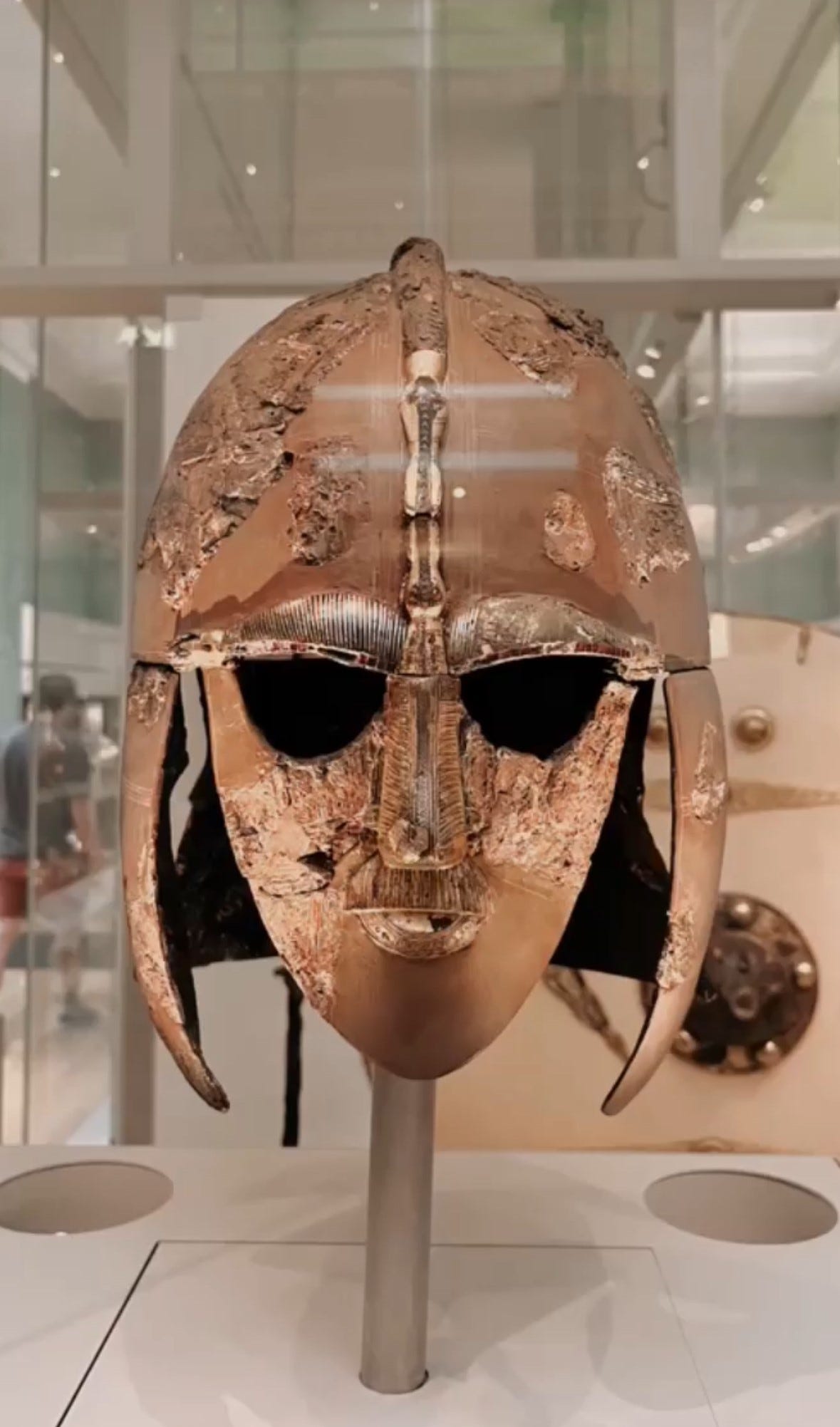The path to power among people everywhere.
The importance of influencing in Beowulf
Thank you to all who contributed to the formation of this post by interacting with a Note I posted a few weeks ago (linked here if you’d like to read it). Your insights on the path to power, from a contemporary perspective, were so, so valuable.
How would you finish this sentence:
The path to power is…
I asked this question on Notes recently, and got some really interesting responses:
- said, ‘finding yourself, first’ - a sentiment that I’m sure is shared widely, especially amongst millennials and younger generations.
- answered simply, ‘stony’. Of course I had to ask more about that! What did he mean by ‘stony’? Did he mean the experience of searching for power or the source of said power?
I think I would say, ‘challenging and frequently trodden’, but even then I find myself wanting to add so much more detail and nuance (e.g., frequently trodden but not often completed, or challenging and not easily overcome - and that’s without even beginning to speak on what constitutes power).
I’d like to share, in today’s post, an early medieval poetry extract that deals with exactly this theme: the path to power. Yes, even in the mists of the first millennium A.D., over a thousand years ago, the concept of power and how one might get hold of it was being debated and mythologised. It could be argued that the very construct of power was being formed and constituted anew in these islands following the collapse of society in the early fifth century; everything was new and up for grabs.
Beowulf - an excerpt
So. The Spear-Danes in days gone by and the kings who ruled them had courage and greatness. We have heard of those princes' heroic campaigns. There was Shield Sheafson, scourge of many tribes, a wrecker of mead-benches, rampaging among foes. This terror of the hall-troops had come far. A foundling to start with, he would flourish later on as his powers waxed and his worth was proved. In the end each clan on the outlying coasts beyond the whale-road had to yield to him and begin to pay tribute. That was one good king. Afterwards a boy-child was born to Shield, a cub in the yard, a comfort set by God to that nation. He knew what they had tholed, the long times and troubles they'd come through without a leader; so the Lord of Life, the glorious Almighty, made this man renowned. Shield had fathered a famous son: Beow's name was known through the north. And a young prince must be prudent like that, giving freely while his father lives so that afterwards in age when fighting starts steadfast companions will stand by him and hold the line. Behaviour that's admired is the path to power among people everywhere.
Beowulf, tr. Seamus Heaney, 1999 (Faber & Faber Ltd: London).
Remembering a heroic, romanticised past
This section of the poem describes the warrior kings of a bygone age who have become legendary in the narrator’s society.
The sharing of heroic tales was a common pastime in the culture Beowulf was based on, likely to be early Anglo-Saxon England or contemporary Scandinavia. Felix’s Life of Saint Guthlac, written some time in the first half of the eighth century, tells us that Guthlac, a young warrior, ‘remembered the valiant deeds of heroes of old’ and ‘contemplate[d] the wretched deaths and the shameful ends of the kings of his race in the course of past ages'.’1 This strengthened him to take up arms at the head of a large band of followers, ‘as though awakening from a sleep’.2
Later, in the ninth century, the tracing (or construction) of genealogies was used to add a further layer of legitimacy to the claims of ruling dynasties. It was important to be able to identify descent from particular heroic individuals in the distant past. The Anglo-Saxon Chronicle was compiled from the late ninth century onwards, initially at the direction of King Alfred the Great. Its introduction (included in manuscripts ‘A’ and ‘G’) traces Alfred’s own lineage back to Cerdic and Cynric, the semi-mythical founders of the West Saxon kingdom, and through them to Woden, a pagan Germanic god.3
In Beowulf, Shield Sheafson is the founder of an important dynasty, much like Cerdic and Cynric for the West Saxons. He has become famous for his raiding prowess, striking fear into the hearts of his foes and bringing about their subjection to his authority:
scourge of many tribes, a wrecker of mead-benches, rampaging among foes. ... In the end each clan on the outlying coasts beyond the whale-road had to yield to him and begin to pay tribute.
Shield’s son, Beow, continues his father’s legacy, proving to be another heroic prince that people praise:
Beow's name was known throughout the north.
These two characters, then, have become woven into the history of the ‘Spear-Danes’, epitomising the qualities of ‘courage and greatness’ prized by the culture of the poem’s narrator. Their stories have been shared from hearth to hearth, encouraging fledgling warriors with their ‘heroic campaigns’.

A modern sentiment in ancient words
There is so much that could be brought out of this extract from Beowulf, but one line struck me in particular:
‘Behaviour that’s admired is the path to power among people everywhere.’
This felt like it could have been written yesterday.
It stopped me dead in my tracks as I read through the poem: I felt as if the poet was reaching out to me, across a millennium, and reading right into my heart and mind.
How much of the modern world is predicated upon this ideology: grasping after power by displaying oneself to the world in a particular way?
For the Beowulf poet, as for the characters in their narrative, this was all to do with kingdom formation and dynastic security. It was by looking better than others, looking stronger or having greater genealogical legitimacy, that individuals managed to hold onto their grip on power and call themselves kings. Monarchy itself was not really fully established in the way that it is today, so emergent families worked exceptionally hard to build and maintain the admiration of others and, as a result, power.
Very few of us today are trying to build kingdoms.
But I wonder if this quote struck a chord with me because I am, in a way, trying to build a metaphorical kingdom for myself by looking good to others…
Is that what I’m doing here, on Substack? Is that what millions (billions?) are trying to do on other social media platforms? Is power what we’re really searching for (even if we wouldn’t describe it in this way)?
This is not to say that there is necessarily anything wrong with this. I think we tend to think power = bad, and it is certainly true that power has been abused by some for bad means. We often associate power with trampling over others - but does this have to be the case? Can we be admired by others without becoming proud or arrogant, for example?
I think we can (I certainly admire a lot of people, and I think that they hold some sort of power over me as a result), but that conversation goes well beyond the remit of the vision here at Telling Their Tales. What we can see, however, in this short extract from Beowulf, is that medieval men and women were having the same thoughts and discussions as we do today. I can’t imagine that this poem was written into a vacuum, and can envision many around the hearth going, “huh?!” when lines like this were performed.
We aren’t really so different from them, even if our physical world would be almost unrecognisable if they were to visit.
Similar posts you might also enjoy:
Telling Their Tales - What's it all about?
Hi there, I’m Holly. Welcome! I’m currently a full-time stay-at-home-mum, having welcomed our little one in May 2023, and I pursue my love for reading and writing history in the edges of motherhood (read: during nap times). Motherhood has changed me entirely in more ways than I have words to describe here, but one of the best is that I’ve been able to sp…
This essay forms part of my contribution to the Sparkle on Substack Essay Club, hosted by
. It’s essay 2/24.
Felix, Life of Saint Guthlac, chs. 16 & 18. tr. Bertram Colgrave (1956). Felix’s Life of Saint Guthlac. Cambridge: Cambridge University Press, p.81 and 93.
Ibid, ch.16 (p.81).
The Anglo-Saxon Chronicle, introduction. ed. Dorothy Whitelock (1979). English Historical Documents Vol.1, c. 500-1042. 2nd ed. New York: Oxford University Press, p. 146.











Great writing Holly. Thought provoking.
Self reflection is the word that comes to my mind right now.
Appreciated behavior or behavior that would be appreciated is a very accurate description of how many of us would think.
Yes maybe not everything is bad or for a wrong reason. But the idea I would connect here is that such a behavior should be good for the person himself first.
It should serve him or her first.
Only then it can be beneficial for others.
But this can be a long talk.
A talk we don't do often.
A talk about who we are first and how do we want to serve the people around us
Do we want to serve them for the sake of appreciation and image
Or do we want to serve them because that's what WE ( you and I) want to do ?
Is it a purpose or a shadow you are chasing?
Because purpose will fulfill you+ serve others around you.
A shadow may seem shiny right now but won't be forever, so what do you choose?
YOU or the image of YOU?
Terrific essay, and thanks for the mention, Holly! As a side note: I like how Romance languages use two different words for "power". In French: "pouvoir" and "puissance", in Spanish, "poder" and "potencia". Maybe this equates to "power" vs "potency" in English as well... The former means something like "power over", a form of influence that you (wish to) get, that you (wish to) acquire over others, or rather, that others may recognise in you and submit to--it's a fundamentally ego-driven and competitive ("stony") quality... The latter means "power to", or "being able to", one's own mastery, one's own talent or creativity--it's a giving quality. I guess the Beowulf poem shows how "puissance" may be conducive to "pouvoir", no?